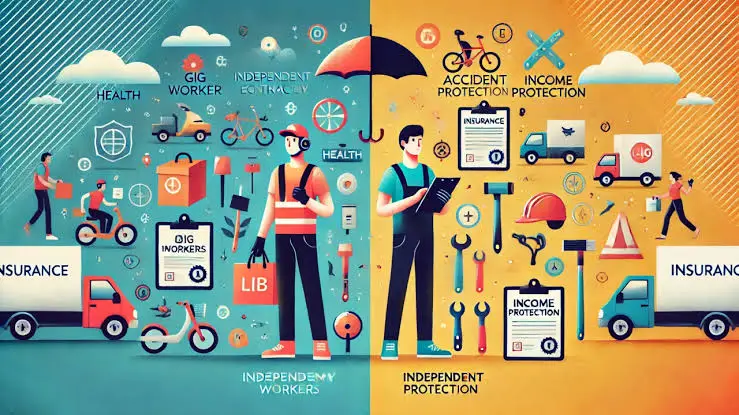Insurance for Freelancers and Independent Contractors is becoming increasingly essential in today’s dynamic gig economy, where more professionals are choosing self-employment. This career path offers flexibility, autonomy, and the potential for lucrative earnings. However, it also comes with unique responsibilities and risks—particularly in terms of insurance coverage. Unlike traditional employees, freelancers and independent contractors must secure their own protection against unexpected events. That’s where understanding the right insurance options becomes crucial.
This comprehensive guide explores why insurance matters for freelancers, the types of insurance you might need, how to choose the right policies, and how to manage costs while ensuring you’re adequately protected. Whether you’re a writer, designer, consultant, or tradesperson, this article will help you navigate your insurance options confidently and responsibly.

Why Freelancers and Independent Contractors Need Insurance
Freelancers are essentially business owners. When you work independently, you assume the full financial responsibility for mistakes, accidents, injuries, and other liabilities. Insurance helps mitigate those risks.
Key Reasons to Get Insurance:
- Legal Protection – You can be sued for professional errors, contract breaches, or accidents.
- Client Requirements – Many clients require proof of insurance before signing a contract.
- Peace of Mind – Coverage helps reduce stress and uncertainty when the unexpected happens.
- Professionalism – Having insurance increases your credibility and trustworthiness.
- Income Continuity – Certain policies can protect your income if you’re unable to work.
Common Types of Insurance for Freelancers and Independent Contractors
Understanding the range of available policies is key to choosing the right protection. Here’s an in-depth look at the most important types of Insurance for Freelancers and Independent Contractors.
1. General Liability Insurance
This covers third-party claims for bodily injury, property damage, and advertising injury (e.g., defamation, copyright infringement).
Example: A client visits your home office and slips on the floor. General liability insurance covers their medical expenses.
Best for: Designers, photographers, consultants, marketers, and anyone with face-to-face client interactions.
2. Professional Liability Insurance (Errors & Omissions)
Protects against claims of negligence, mistakes, or failure to deliver professional services. Often referred to as E&O insurance.
Example: A freelance consultant provides inaccurate business advice resulting in a client’s financial loss. This policy covers legal fees and settlements.
Best for: Writers, consultants, web developers, financial advisors, and marketing professionals.
3. Business Owner’s Policy (BOP)
Combines general liability insurance with commercial property insurance. Ideal for freelancers who operate from a physical location or own business equipment.
Example: A fire damages your photography studio and expensive gear. BOP helps cover repair or replacement costs.
Best for: Freelancers with physical assets such as photographers, artists, and videographers.
4. Cyber Liability Insurance
Covers data breaches, cyberattacks, and loss of client data. This is increasingly important as more work is done digitally.
Example: A hacker accesses client data on your computer. Cyber liability helps cover notification costs, legal fees, and damages.
Best for: IT professionals, web developers, writers, and anyone storing sensitive client information.
5. Health Insurance
Since freelancers don’t receive employer-sponsored health coverage, private or marketplace health insurance is necessary.
Options Include:
- Marketplace plans (via Healthcare.gov)
- Health sharing ministries
- Freelancer-specific plans (through groups like Freelancers Union)
Tip: Look into subsidies if your income qualifies under the Affordable Care Act (ACA).
6. Disability Insurance
Provides income replacement if you can’t work due to illness or injury. Short-term and long-term policies are available.
Example: You suffer a hand injury and can’t work as a freelance illustrator for three months. Disability insurance provides partial income.
Best for: All freelancers, especially those who rely heavily on physical or mental skills.
7. Life Insurance
Protects your loved ones financially in case of your death. Term life is often the most affordable and suitable for freelancers.
Example: You want to ensure your family can pay bills and cover debts if something happens to you. Life insurance offers that peace of mind.
Best for: Freelancers with dependents, loans, or significant financial responsibilities.
8. Workers’ Compensation Insurance
While not typically required for solo freelancers, it becomes necessary if you hire employees or subcontractors.
Some states may require freelancers in certain trades (e.g., construction) to carry this insurance even without employees.
Industry-Specific Insurance Needs
Different freelancing fields have unique risks. Here’s a breakdown of coverage by industry:
Creative Professionals (Writers, Designers, Photographers)
- Professional Liability
- General Liability
- Business Owner’s Policy
- Equipment Coverage
Tech Freelancers (Developers, IT Consultants)
- Cyber Liability
- Professional Liability
- General Liability
Consultants and Coaches
- Professional Liability
- General Liability
- Life & Disability Insurance
Tradespeople (Electricians, Plumbers)
- General Liability
- Tools & Equipment Insurance
- Workers’ Comp (if hiring)
- Commercial Auto (if using a vehicle for work)
Health and Wellness Professionals (Therapists, Trainers)
- Professional Liability (aka Malpractice)
- General Liability
- Business Owner’s Policy
How to Choose the Right Insurance Policies
With so many types of insurance available, choosing the right ones may feel overwhelming. Here are the steps to simplify the process:
- Assess Your Risks
- Think about worst-case scenarios in your line of work.
- Consider both physical and digital risks.
- Know Your Clients’ Requirements
- Some clients or contracts mandate specific coverage levels.
- Keep proof of insurance (Certificates of Insurance) ready.
- Check Legal Obligations in Your State
- States may have minimum coverage requirements for certain professions.
- Evaluate Your Assets
- If you have expensive tools, tech, or office space, include property protection.
- Work With a Licensed Broker or Agent
- An insurance professional can help tailor coverage and find affordable policies.
- Compare Quotes Online
- Use comparison tools to review coverage options, limits, and pricing.
Tips to Manage Insurance Costs
Insurance can be a significant expense for freelancers, especially early on. Here are tips to keep costs reasonable:
- Bundle Policies – Purchase multiple coverages (e.g., BOP) from one provider for discounts.
- Choose Higher Deductibles – This lowers premiums but increases out-of-pocket costs for claims.
- Only Buy What You Need – Avoid unnecessary add-ons.
- Pay Annually – Many providers offer a discount for upfront yearly payments.
- Improve Risk Management – Using secure systems, training, or contracts can reduce claims.
Where to Buy Insurance for Freelancers and Independent Contractors
Several insurers and marketplaces cater specifically to independent workers. Here are some well-known options:
- Next Insurance – Affordable, online policies tailored for small businesses and freelancers.
- Hiscox – Flexible monthly plans for freelancers in many industries.
- Thimble – On-demand insurance for short-term projects or events.
- Freelancers Union – Offers health insurance, liability coverage, and member benefits.
- CoverWallet and Simply Business – Aggregators that help compare quotes from multiple providers.
What to Include in Your Insurance Portfolio
A strong insurance portfolio for a freelancer should ideally include:
- General Liability Insurance
- Professional Liability Insurance
- Cyber Liability Insurance (if online-based)
- Health and Disability Insurance
- Life Insurance (if you have dependents)
- Commercial Property Insurance (if you own physical assets)
Frequently Asked Questions (FAQ)
1. Is insurance mandatory for freelancers? Not always, but some states and clients may require certain coverage types. It’s a smart business practice even when not legally required.
2. How much does freelancer insurance cost? Depends on the type of policy, industry, and coverage limits. General liability starts as low as $25/month, while health insurance can vary widely.
3. Can I write off insurance costs on my taxes? Yes. Business-related insurance premiums are often tax-deductible. Consult with a tax advisor.
4. Do I need insurance if I work from home? Yes. Homeowners insurance usually doesn’t cover business-related claims.
Final Thoughts
As the freelance economy continues to grow, understanding and investing in Insurance for Freelancers and Independent Contractors becomes more critical than ever. Insurance isn’t just a safeguard—it’s a foundation for long-term success and credibility in your profession.
By assessing your risks, meeting client expectations, and working with insurance professionals, you can build a solid protection strategy. With the right insurance, you can focus on growing your freelance business, serving clients, and enjoying the freedom and flexibility that independent work offers.
Don’t wait until something goes wrong. Take proactive steps today to protect your freelance career.
If this article was informative also checkout: Home Insurance Riders You Might Need
also checkout: Click Here



